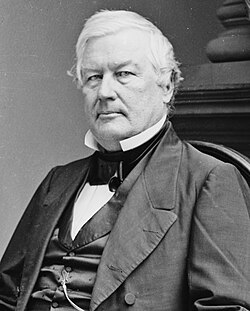📖 Presidential Profile
Comprehensive overview of leadership, policies, and historical significance
📋 Biography & Political Journey
Rise from Poverty to Politics
Millard Fillmore was born on January 7, 1800, in a log cabin in Summerhill, New York, to Nathaniel Fillmore and Phoebe Millard Fillmore. The second of nine children, Fillmore grew up in poverty on his father’s tenant farm in the Finger Lakes region. He received minimal formal education and was apprenticed to a cloth dresser at age 15, but his determination to improve himself led him to purchase his release from the apprenticeship and study law. He was admitted to the bar in 1823 and established a successful law practice in East Aurora, New York, specializing in debt collection and real estate law.
Fillmore’s political career began with his election to the New York State Assembly in 1828 as an Anti-Masonic candidate, where he championed legislation to abolish imprisonment for debt. He served four terms in the U.S. House of Representatives (1833-1835, 1837-1843) as a Whig, becoming a prominent advocate for protective tariffs and internal improvements. As chairman of the House Ways and Means Committee, he helped draft the Tariff of 1842, which raised duties to protect American manufacturing. Fillmore served as New York State Comptroller (1847-1849) before being nominated as Zachary Taylor’s running mate in 1848 to balance the ticket geographically and ideologically.
Fillmore became president on July 9, 1850, following Taylor’s sudden death from illness, inheriting a nation on the brink of sectional crisis over slavery in the territories acquired from Mexico. Unlike Taylor, who opposed any expansion of slavery, Fillmore supported compromise measures to preserve the Union. His most significant presidential act was signing Henry Clay’s Compromise of 1850, which admitted California as a free state while strengthening the Fugitive Slave Act and allowing popular sovereignty in Utah and New Mexico territories.
The Fugitive Slave Act Controversy
Fillmore’s enforcement of the Fugitive Slave Act of 1850 became the most controversial aspect of his presidency and severely damaged his reputation in the North. The law required federal officials and ordinary citizens to assist in capturing runaway slaves and imposed heavy penalties on those who refused to cooperate or aided escaping slaves. Fillmore believed that faithful execution of this law was necessary to preserve the Union and honor the constitutional compact with Southern states, but his vigorous enforcement alienated many Northern Whigs and abolitionists. The dramatic cases of escaped slaves being returned to bondage, such as that of Anthony Burns in Boston, generated massive protests and increased support for the Underground Railroad. Fillmore’s deployment of federal troops to enforce slave captures in Northern cities created a crisis of conscience for many Americans and contributed to the growth of anti-slavery sentiment that would eventually lead to the Republican Party’s formation and Lincoln’s election.
The White House Bathtub Revolution
One of Fillmore’s most enduring legacies was his installation of the first permanent bathtub in the White House, though this achievement was later revealed to be a complete hoax perpetrated by journalist H.L. Mencken in 1917. The fictional story claimed that Fillmore had to overcome congressional opposition and public health concerns to install the revolutionary bathing apparatus. The real Fillmore did modernize the White House in more mundane but practical ways, including the installation of the first White House library and cooking stove. However, he did have an unusual obsession with cleanliness and was known to take multiple sponge baths daily, leading to his nickname among White House staff as “His Scrubness.” Fillmore also insisted on personally inspecting the White House kitchens daily and reportedly once surprised the cook by demonstrating his own superior technique for preparing his favorite dish of salt pork and beans, declaring, “A president must know how to cook for himself—you never know when democracy might require it.”
Humor & Jokes
Whig Party Collapse
Fillmore's presidency coincided with the collapse of the Whig Party. He was like the captain…
Read More →Greatest Wins
⚖️ Fugitive Slave Law Enforcement: Maintaining Constitutional Order
Despite personal reservations, Fillmore enforced federal law consistently, demonstrating presidential duty to uphold constitutional obligations.
Read More →Epic Fails
🚢 Commodore Perry's Forced Opening of Japan
Fillmore authorized gunboat diplomacy to force Japan's isolation to end, raising questions about American imperialism…
Read More →